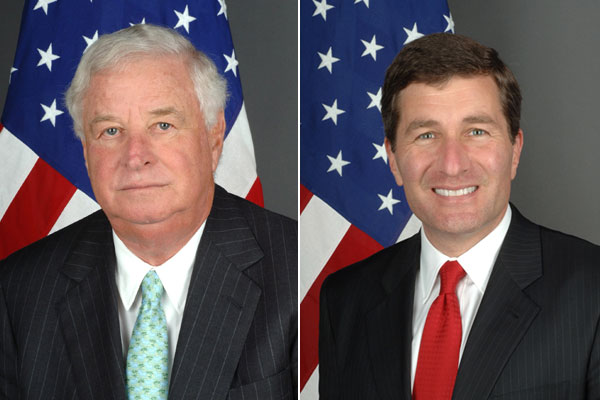
Louis Susman, Charles Rivkin
This morning Politico posted a must-read investigation by iWatch News, part of the Center for Public Integrity, a nonprofit that conducts the sort of investigative reporting that has become beyond the budgets and staffs of many dailies.
The results of the three-man reporting team are fascinating, albeit predictable—for all his promises of change, President Obama, like his predecessors, rewards his top funders with cushy, prestigious jobs. In fact, he outdoes George W. Bush: “Public Citizen found in 2008,” the reporters note, “that President George W. Bush had appointed about 200 bundlers to administration posts over his eight years in office. That is roughly the same number Obama has appointed in a little more than two years…”
The piece is long—almost 3000 words—and I would have been inclined to scan it on a busy morning, but I have written about several Chicago bundlers who have landed the most coveted ambassadorships, and I especially wanted to see what the investigative team had to say about Louis Susman, who seems to be relishing his Obama appointment as U.S. ambassador to England, and about Charles Rivkin, whom Obama posted to Paris. (Bundlers reach into their rolodexes and gather up individual contributions, up to the legal limit of $2,300 per election.)
I read the piece, and Susman (a former attorney and investment banker who bundled $500,000 for Obama) and Rivkin (a former producer of children’s television who bundled $800,000) were missing. One of the reporters on the piece, Fred Schulte, an award winning reporter, formerly of the Baltimore Sun and the South Florida Sun-Sentinel, told me that he and his colleagues found “24 bundler ambassadors.” That they didn’t mention my two Chicago guys by name is meaningless. “We’re not trying to cover for them; we didn’t mention most of the 24 by name.”
If one were to survey the political players who have the contacts and energy to bundle contributions at the highest level, and if one were to ask them what job or reward would please them most should their candidate take the White House, I would wager that postings to London and Paris would top the list—especially London because one need not know a foreign language.
In late 2009, while writing the Susman piece, I interviewed Sheila Krumholtz, executive director of the Center for Responsive Politics. She described the American political tradition of giving diplomatic posts to big contributors as “a donor rewards program.”
And so it continues, but in today’s otherwise comprehensive story, without Exhibits A and B.
Post Script: Another important story that Chicagoans might miss.
In today’s New York Times, Sharon Otterman reports on a study by the New York State Education Department that shows that “only 37 percent of [New York state] students who entered high school in 2006 left four years later adequately prepared for college, with even smaller percentages of minority graduates and those in the largest cities meeting that standard.” Digging deeper into the data, Otterman notes that, based on results of state tests in math and English, in New York City, only 21 percent of students starting high school in 2006 and graduating in 2010, could be classified as ready for college. “In Rochester,” she writes, “it was 6 percent.” (Emphasis added.)
The Chicago Public Schools’ new CEO, Jean-Claude Brizard, comes to us from Rochester where he was superintendent of the city’s schools.
I called the CPS communications office to request a comment from Brizard about that startlingly low number. No answer as of post time.
Photographs: U.S. Department of State


